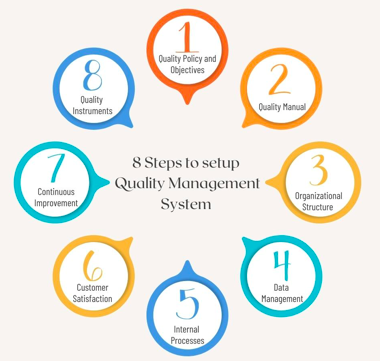Why a quality management system is pivotal for your technology firm ?
Why a quality management system (QMS) is pivotal for your technology firm ?
Quality management system (QMS) is a systematic approach to managing and integrating entire processes, procedures, and responsibilities within your organization to ensure they meet customer requirements. QMS enables your organizations to identify, measure, control and improve the various business processes.
QMS helps to improve and direct your organization’s activities to effectively meet your customers and regulatory requirements by providing a framework for continuous improvement in all organization’s operational business. In addition allows you to identify problems early, so corrective actions can be taken before it becomes too late.
Implementing a quality management system ultimately leading to instill confidence in your organization and enhance customers satisfaction. And other benefits include operational consistency, improved productivity, reduced costs, increased efficiency, better service delivery, and enhanced reputation.
Types of quality management systems:
There are many different types of quality management systems, each with their own advantages and disadvantages. Some of the most common ones are:
- Standardised systems – these rely on established standards and follow agreed codes and regulations. Examples include ISO certifications such as ISO 9001(https://www.iso.org/obp/ui/#iso:std:iso:9001:ed-5:v1:en). To pass the ISO standards, a business needs to satisfy all the requirements relating to quality and documentation, as well as audits.
- Total quality management – TQM is a management framework that relies on continuous, organisation-wide efforts to ensure long-term customer loyalty and success. It places a strong focus on process measurement and controls as means of continuous improvement.
- Continuous quality improvement – this system, also known as CQI, focuses on continual incremental improvements, rather than processes and functions. The emphasis is on teams and individuals, and their importance in ensuring the quality of products and services. One of the most popular continuous improvement tools is a four-step quality model, the Plan-Do-Check-Act (PDCA) cycle.
- Six Sigma – this is a data-driven methodology that focuses on process improvement. Under this approach, the processes are defined, measured, analysed, improved and controlled to achieve maximum quality.
Some of the common elements/requirements of QMS:

ISO 9001 is the basic and most recognized standard that defines the QMS requirements.
ISO 9001 integrates with other management systems where the structure is the same, such as IATF 16949:2016, ISO 14001:2015 (Environmental Management Standard), and ISO 45001:2018 (Occupational Health and Safety Management standard), etc.
There are 7 Quality Management System principles described in ISO 9001 standard:
- Customer focus
- Leadership
- Engagement of People
- Process Approach
- Improvement
- Evidence-Based Decision Making
- Relationship Management










